The Central Bank of the UAE has stepped up action against banks following complaints of mis-selling on consumer and investment products, a senior executive at the institution said on Tuesday,
Nariman Alawadhi, chief manager at the Central Bank, said that 100 clients have had money returned to them by banks thanks to the institution's clampdown.
"We get a lot of complaints about investment products. The consumer is ignorant and does not know much; at the same time the bank is not clear and does not tell you if this product is good for you or not," she told delegates at a business platform on financial literacyamong the nation's youth, hosted by the Emirates Foundation.
Ms Alawadhi revealed that the Central Bank set up a separate consumer protection division four months ago to tackle complaints directly; previously, she said this was run on an ad hoc basis and was part of the banking supervision department.
"That’s a big signal to the banks that we are taking consumer protection seriously,” she said, adding that the new department is reviewing many financial products including credit cards.
Ms Alawadhi said financial institutions are now more responsive to consumer complaints than they have been in the past.
She cited one unnamed bank, which has asked the Central Bank not to stop forwarding complaints, instead allowing them two days to resolve them.
“So they are listening and now many CEOs are taking it seriously,” she added.
___________
Read more:
Central Bank turns attention to complaints of mis-selling investment products
Personal loans in the UAE rose in July, says Central Bank
___________
In May, the Central Bank issued a circular advising banks and finance companies to resolve all outstanding mis-selling complaints “amicably” and within a deadline of just 90 days.
It issued the circular in response to “an increasing number of complaints in relation to the savings and investment insurance/takaful products”. The mis-selling complaints all have a common theme, with customers sold policies that are “complex in nature and are not well understood”, according to the circular.
The Central Bank’s focus on consumer protection harks back to 2011, when the institution experienced a high number of complaints as UAE residents struggled with overindebtedness.
“The complaints increased and many were in financial difficulties; it was not only complaints but requests for help. They were over burdened with debt - their installments were 100 per cent of their salaries,” she said.
"The common theme with everyone in financial difficulty is ignorance; we have doctors that come to us, engineers ... but when it comes to financial literacy they do not know how to handle a cheque book or what they were paying on credit cards.”
The Central Bank tackled this by introducing new regulations around lending in 2011.
Limits were applied to personal and car loans, with caps for the amount banks can lend to customers at 20 times their salary and the maximum period of loan repayment at 48 months. In addition, the rules restricted the service fees lenders can charge for personal accounts, cheques and debit cards.
The roll out of the Al Etihad Credit Bureau's services in 2014 helped to prevent indebtedness further, however, Ms Alawadhi said the awareness is still not there.
“The Credit Bureau is an independent body and they work closely with us, however, people still don’t know what the credit bureau is.”
She called for a national strategy on financial awareness to help residents make more informed decisions.
Clare Woodcraft Scott, the chief executive of the EF and the host of the business platform, said the independent philanthropic organisation, would support such an initiative.
However, she said EF’s Esref Sah Programme, which has been running for five years to increase awareness and access to effective financial education for the nation’s youth, has struggled to get banks to support their campaign.
“Until today only two banks have engaged with us on our financial literacy programme and even then somewhat reluctantly and not in any long term systemic fashion,” she said.
"We see the banks as our partners and we are here to improve the quality of their underlying assets and to improve the quality of their engagement with their clients. Once I was accused of putting all the blame on the banks – we are trying to make the general public realise that is their responsibility."


